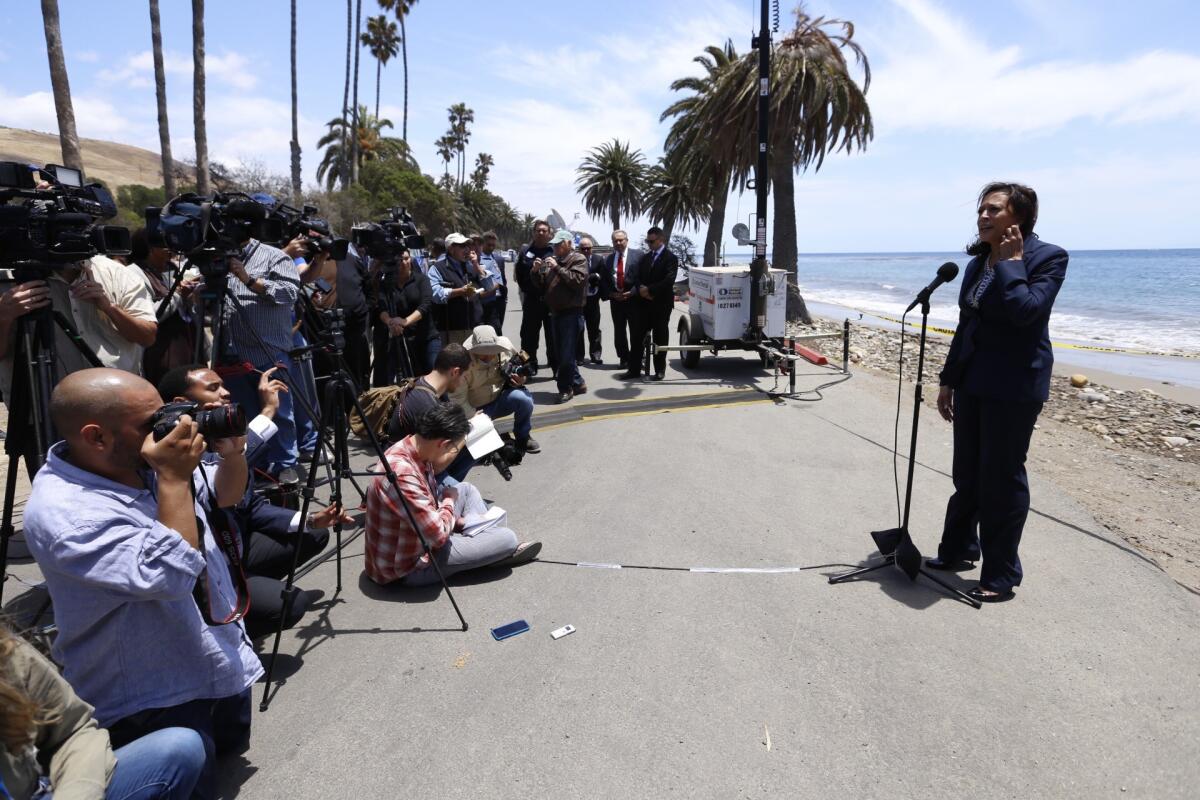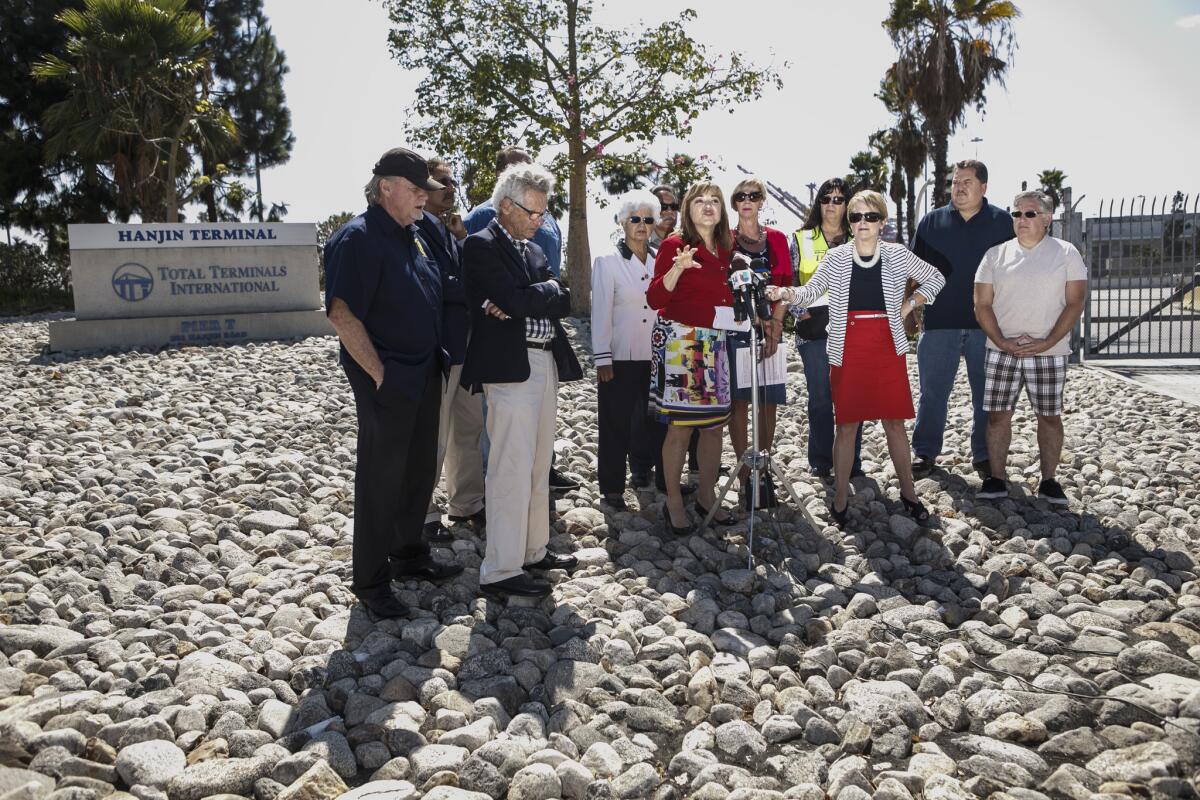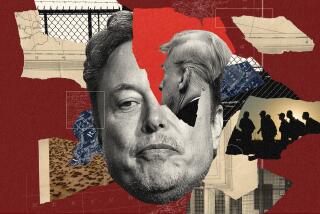When running for U.S. Senate, it’s good to be the highly visible California attorney general

- Share via
Reporting from Sacramento — U.S. Senate candidate Kamala Harris had a particularly good day earlier this month. In the morning, she landed endorsements from the state’s two U.S. senators and hours later, from her perch as California attorney general, she announced the arrest of an Internet CEO on allegations of sex trafficking.
Both stories attracted a flurry of news coverage up and down the state and across the U.S., providing a lift not only to Harris’ national profile but also to her ongoing Senate campaign against Orange County Rep. Loretta Sanchez.
But while trumpeting endorsements is nothing new for a campaign, the publicity Harris received after the arrest of backpage.com CEO Carl Ferrer demonstrated the political advantages high-profile incumbents have while they are appealing to voters for reelection or higher office.
When it comes to attracting positive news coverage, Harris has had a distinct edge over Sanchez, who has represented her Orange County congressional district for nearly 20 years, said Dan Schnur, director of the Jesse M. Unruh Institute of Politics at USC.
There is only one California attorney general and there are 435 members in the House of Representatives — 53 in California alone. Harris is based in California; Sanchez is more than 3,000 miles away in Washington.
The attorney general can make executive decisions and file criminal charges against wrongdoers. To pass legislation, members of Congress must win over a majority of both the House and Senate, which has been all the harder for Sanchez since her Democratic Party has controlled the House for only four years of her 20-year tenure. Some of Sanchez’s biggest accomplishments, including her efforts to protect members of the military from sexual assaults, have ended up as amendments tucked deep inside bills winding through Congress.
“Harris has two big advantages. First of all, she represents the entire state of California, while Sanchez represents only 1/53 of the state,” Schnur said. “Second, the United States Congress is extraordinarily unpopular with most Californians and most Americans. Harris has the benefit of being able to talk about being California’s top crime fighter and public safety officer.”
News coverage increases candidates’ name recognition among voters, which is essential in a state as vast as California, but it does so without costing their campaigns a dime in political advertising, Schnur said. An aggressive and effective advertising campaign in this state, with some of the most expensive media markets in the nation, can run in the tens of millions of dollars.
Democratic pollster Celinda Lake said it’s essential for incumbents to take advantage of “free media” to get their record out and display their qualifications for office.
“But you have to be careful not to play it as being part of the status quo, or being part of the problem and not part of the solution,” Lake said.
In just the last few weeks, the attorney general has appeared in Fresno to announce a new cyber crime center to assist local law enforcement, released a new database of firearm sales data in the state and announced the indictment of Ferrer — all of which made headlines.
On Wednesday alone, Harris released an annual report on her agency’s efforts to combat elementary school truancy and The Times also reported that her office had served Wells Fargo with a search warrant, looking for evidence that bank workers criminally stole customers’ identities to create unauthorized bank accounts.

The 2015 oil spill in Santa Barbara County was another example of the advantage Harris, California’s top law enforcement official, has over Sanchez in regard to visibility.
A month after an oil pipeline spilled more than 100,000 gallons of crude, Harris walked along Refugio State Beach to assess the damage — with newspaper and TV news camera crews capturing it all — and vowed swift prosecution of any criminal wrongdoing that investigators might uncover.
Sanchez expressed her concerns about the oil spill two days later, at an event in Long Beach. Sanchez called for federal action but, unlike Harris, Sanchez had little power to take action as a member of the minority party in Congress.
Harris returned to Santa Barbara in May to announce a 46-count indictment of the company that operated the pipeline, Plains All American Pipeline.
“Anyone that violates the law in endangering our wildlife and our oceans is going to be held accountable,” Harris said into a bouquet of TV and radio microphones at a news conference announcing the charges.
In July, Harris was interviewed by Jake Tapper on CNN after the fatal police shootings of two black men triggered a wave of protests nationwide. Harris said Philando Castile, who was shot and killed by a Minnesota police officer during a traffic stop, would be alive today had he been white.
Former state Atty. Gen. Bill Lockyer said that, among California politicians, the state attorney general comes second only to the governor when it comes to generating news. And the attorney general is often seen in a more favorable light, he said.
“It’s a visible office. Almost everything the attorney general does people approve of,” said Lockyer, who served as state attorney general and treasurer, as well as president pro tem of the state Senate and as a state assemblyman. “They’re fighting crime, protecting the environment, protecting kids. There’s not a lot of PR negative there.”
Many of Harris’ official press conferences are held at the attorney general’s offices in Los Angeles and San Francisco, the state’s two largest media markets, not at the state Capitol in Sacramento.
Lockyer, who supports Harris, dismisses speculation that press conferences may be purposely staged just to benefit an ongoing political campaign, especially as attorney general.
“You just don’t have that luxury,” Lockyer said. “There’s just so much that’s going on there, and every day the attorney general makes decisions that have an impact on the people of California, the environment or the business of California.”
Though more challenging for Sanchez, the congresswoman has attracted a fair amount of coverage centered on her job in Washington, especially as a member of the House Armed Services and Homeland Security committees.
Since announcing her bid for Senate in May 2015, Sanchez has appeared on CNN to discuss the threats posed by Islamic State, on MSNBC to give her assessment of the March terrorist attack in Brussels and on “PBS NewsHour” to talk about the case of accused Army deserter Sgt. Bowe Bergdahl. Sanchez is a frequent guest on local and national Spanish-language stations, and is often interviewed in both English and Spanish about national immigration policy.
But the attention is not risk-free, as Sanchez found out in December after a terrorist attack in San Bernardino left 14 people dead. Sanchez was interviewed by several news outlets, and in an interview with Larry King, she suggested that 5% to 20% of Muslims support a caliphate, a strict Islamic state. The comment attracted immediate criticism from Muslim organizations and has dogged Sanchez throughout the Senate campaign, though the congresswoman insists that her statement has not been refuted by any credible source.
“You’re a much bigger target, and you’ve got a record,” said USC political scientist Ann Crigler. “The attention is on you, and you have to have good behavior all the time.”
Along with the favorable publicity Harris has received as attorney general, she’s also come under fire on high-profile cases. Earlier this year, some civil rights activists and members of California’s Legislative Black Caucus criticized Harris for opposing legislation that would require her office to independently investigate fatal police shootings. That, too, has followed Harris throughout her campaign.
And during the campaign, Harris’ critics questioned why the attorney general defended a California Coastal Commission permit that allowed more than 300 million pounds of nuclear waste to be buried at the San Onofre Nuclear Power Plant site in northern San Diego County.
“I am the lawyer for the state,” Harris said during a debate held the month before the June primary when asked about defending the Coastal Commission. “I cannot talk about that.”
Public scrutiny and acclaim are all part of the territory for high-profile elected officials, Crigler said. Most politicians have an eye on reelection or being elected to a higher office, so it makes sense that they think strategically about attracting the most positive coverage they can about their achievements and points of view.
“Can they abuse it? Yeah, they probably can,” Crigler said. “But it’s not that easy to do.”
Election 2016 | California politics news feed | Sign up for the newsletter
Twitter: @philwillon
ALSO:
Backpage says criminal charges by Kamala Harris are ‘election year stunt’
Updates on California politics
More to Read
Get the L.A. Times Politics newsletter
Deeply reported insights into legislation, politics and policy from Sacramento, Washington and beyond. In your inbox three times per week.
You may occasionally receive promotional content from the Los Angeles Times.











